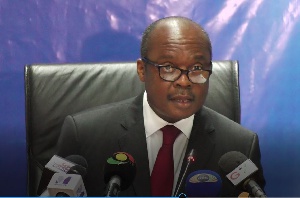In June 2019, West African leaders gathered in Abuja, Nigeria, and made a decision to formally adopt the Eco as its common currency – planning to introduce it in July this year. However, Anglophone West Africa was extremely shocked when its Francophone peers announced in December 2019 that they have replaced the CFA franc with the Eco.
The move annoyed their Anglophone neighbours and quickly prompted a meeting in Abuja of central bank Governors and finance ministers in the region to discuss issues surrounding the Eco – and why the Ivorian president, Alassane Ouattara, unilaterally made such a weighty decision.
This is evident in the fact that even though, initially, Ghana threw its weight behind the idea of the Eco – as President Akufo-Addo said he believes it will reduce trade and monetary barriers, reduce transaction cost, and boost economic activity among other benefits – managers of the country’s economy say they are unhappy with Ivory Coast for making such a unilateral decision.
Governor of the Bank of Ghana, Dr. Ernest Addison, confirmed this in a press conference in Accra; saying there are still unresolved issues regarding the Eco and it requires time to address them – essentially meaning Ghana is not ready to adopt it now.
“ECOWAS as a region had a programme to adopt a common currency that was called the Eco; and the plan for that Eco was to have a unitary common central bank with a flexible exchange rate arrangement. And then we had Cote d’Ivoire announcing that they are replacing the CFA with the Eco.
“So this meeting was called in Abuja to discuss it, and the delegates were not too happy with the fact that the Francophone nations had unilaterally taken the decision to rename the CFA as Eco – because the Eco is not supposed to be a fixed exchange currency. Those were the sentiments we expressed at that meeting. We have said that we still have many unresolved issues regarding reaching the final destination for a common currency.
“First is the issue of macroeconomic convergence prerequisites: if you look at the data, many of the countries still do not meet the prerequisites to enter into a common currency, not to talk of the other complications in agreeing on exchange rate arrangement; agreeing on where the headquarters will be located, or agreeing on whether you are having a unitary or federal arrangement for the central banks and many unanswered questions. , I think that we need to take our time and try to find solutions to these issues,” he said.
What made the announcement even more curious and unbelievable was the fact that ECOWAS countries, through the West African Monetary Institute (WAMI), had come out with ten convergence criteria which member-countries must achieve before they are eligible to join the Eco.
Countries must meet four out of the ten criteria: namely a single-digit inflation rate at the end of each year; a fiscal deficit of no more than 4 percent of GDP; a central bank deficit-financing of no more than 10 percent of the previous year’s tax revenues; and gross external reserves which can give import cover for a minimum of three months.
However, as of today those criteria have not been met by all member-countries – especially the Anglophone neighbours. For example, Nigeria recorded an inflation rate of 11.9 percent at the end of December 2019, whereas Ghana recorded a budget deficit of 4.8 percent during the same period – all shy of the WAMI criteria.
Furthermore, considering the economic situation in member-countries, some experts are of the firm conviction that the ECOWAS region will not be ready to adopt the common currency any time soon. Again, the unilateral decision by the Francophone neighbours have raised serious trust issues among their Anglophone counterparts – who think the decision was made in bad faith and shows gross disrespect to them.
The fact ECOWAS is not ready is underscored by a professor of economics at the University of Ghana, Prof. Peter Quartey, who told the B&FT in an interview that there is no need for the country to rush into adopting the Eco, considering the dangers of doing so when an economy is not ready for it.
“There are some conditions that countries are to meet for the Eco to take-off. But let’s ask ourselves: how many countries have met these conditions consistently for three years? So, basically, we are not ready. Secondly, you will need one or two countries who can serve as an anchor. For example, in the European Union when the euro was being introduced, Germany was the anchor because it had very strong economic fundamentals.
“But in our case, which country would you say is going to be the anchor or dominant leader? You can’t get one now. So if you rush into the Eco, you mess up with the economy and you might end up reversing it. We are just not ready,” he said.
The rift between Anglophone and Francophone countries in the region on adoption of the Eco shows it is unlikely, at least for now, that all member-states are ready to adopt the common currency.
Click to view details



Business News of Sunday, 9 February 2020
Source: thebftonline.com

















